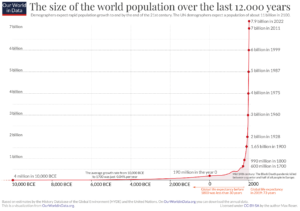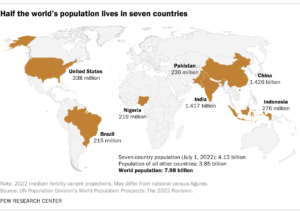
The United Nations has estimated that on November 15, 2022, the number of humans on Earth will have reached eight billion. This momentous event occurs only eleven years from when humanity passed the seven billion milestone, in 2011. This increased rate in population growth mirrors what has taken place since the middle of the 1900s, in which a billion more people have been added to the planet every 10 plus years. Put into even greater context is the fact that it wasn’t until the early 1800s that humanity had passed the one billion mark, meaning the vast majority of population growth has come in a little more than a century.
Unlike population growth rates in the 20th century, much of the recent population growth is happening in lower to lower-middle income nations, many located in sub-Saharan Africa. This should not come as a surprise, as global trends show people living longer and having better access to health care, food stability, and sanitation. Though still very much an issue and a threat to many, extreme poverty has also declined in recent human history. Defined as living on less than $2 a day, the percentage of people living in extreme poverty in 1974 was around 44%. It has now lessened to around 10%.
Though no one can say for certain where the eight billionth person was born, some educated guesses could be made. Currently half of the population of the world lives in 7 countries: China, India, the U.S., Indonesia, Pakistan, Nigeria, and Brazil. China, long holding the rank as most populous nation on the planet, will no longer hold the top spot by the end of 2023. According to demographers, India will surpass the 1.4 billion people living in China and become the most populous nation on the planet.
As the world looks ahead to the next population milestone, nine billion people by 2037, world leaders and activists point to pressing issues associated with our ever-growing humanity and our current societal structures. As humanity grows in numbers, there are fewer resources like food, water, batteries, and fuel to share. This resource issue is exacerbated by the current resource allocation models prevalent around the world. For example, carbon emissions of the richest 1 percent, or roughly 63 million people, were greater than double the emissions than the least wealthy half of humanity (roughly 4 billion people). An additional sign is Earth Overshoot Day, the day each year when humans have used the equivalent of all of the biological resources that Earth regenerated during the entire year. This date has been creeping up and up in recent decades, and occurred this year on July 28th, close to half way through the year. According to Environmental Health News, the last time humanity lived within the productivity limits of our planet was roughly 50 years ago and the planet hosted under 4 billion people, half the number that was just reached.
This week’s Current Events resources examine world population and population rates. The resources shared provide history and context to the global population growth and its impacts on countries, the planet, and future.
Essential Questions, Vocabulary & Extend the Resources:
- How do experts and data scientists determine the world population?
- How do birth and death rates impact world population trends?
- What factors have contributed to the steep incline in population growth over the last century?
- How have global population trends played a role in geopolitical events in recent history?
- What can be learned from understanding where population growth is happening?
- In your opinion, is the global population reaching 8 billion an issue to be dealt with or a matter of fact? Explain.
- In your opinion, will the global trends of population growth continue or will the world begin to see a steep decline? Explain.
Click here for a hardcopy of the Essential Questions and World Population Vocabulary
Click here for a hardcopy of Extension Activities CLP suggests implementing with this content
Videos:
Podcasts:
The world population reaches 8 billion, posing challenges for climate change, All Things Considered, NPR, November 15, 2022
Beyond 8 billion: why the world’s population matters, Today in Focus, The Guardian, November 20, 2022
World Population Hits 8 Billion, Creating Many Challenges, As It Is, VOA Learning English, November 15, 2022
Background Resources:
- #8BillionStrong, United Nations Population Fund
- World Population, Worldometer
- World Population Growth, Our World in Data
- U.S. and World Population Clock, United States Census Bureau
- Global population projected to exceed 8 billion in 2022; half live in just seven countries, Pew Research Center
Recent Articles:
- World Population Hits 8 Billion, U.N. Says, The Wall Street Journal, November 15, 2022
- Global Population Growth Is Slowing Down. Here’s One Reason Why
, Scientific American, December 7, 2022 - Earth now has 8 billion people—and counting. Where do we go from here?, National Geographic, November 14, 2022
- World’s Population Reaches 8 Billion—Here’s What You Need To Know, Forbes, November 15, 2022
- The human race at 8 billion, Axios, November 14, 2022
- Global population hits 8 billion as growth poses more challenges for the planet, CNN, November 15, 2022
Recent Editorials:
- World population reaching 8 billion: What this means for the family of humanity, USA Today, November 11, 2022
- The population question, The New York Times, November 30, 2022
- What the media gets wrong about the new world population numbers, Environmental Health News, November 30, 2022
Graphs and Visual Data:


Lesson Plans:
- 2022 World Population Data Sheet, Population Reference Bureau
- Moving Messages: Pop Videos, World of 8 Billion
- Food for Thought, Population Education
- Patterns: Agriculture + Human Population Growth, California Academy of Sciences
- Human Geography: The Population Bomb, RetroReport in the Classroom
Instructional Materials for Younger Students:
- World’s Population Reaches 8 Billion, News For Kids, November 23, 2022
- Introduction to Population, National Geographic
- Oh, How We’ve Grown Population Education
- United Nations report: World population hits 8 billion, Newsela
- World population predicted to reach 9.6 billion by 2050, Newsela




